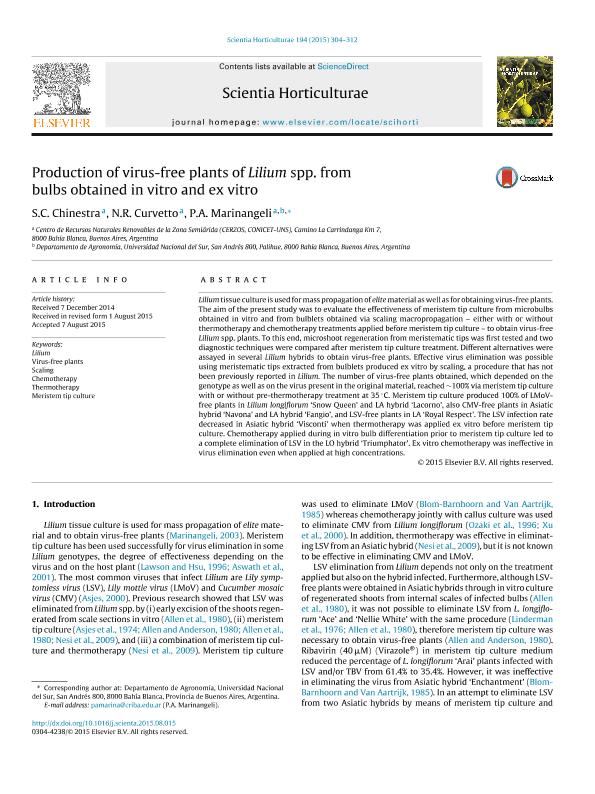Mostrar el registro sencillo del ítem
dc.contributor.author
Chinestra, Silvia Carolina

dc.contributor.author
Curvetto, Nestor Raul

dc.contributor.author
Marinangeli, Pablo Alejandro

dc.date.available
2017-09-28T15:48:39Z
dc.date.issued
2015-10
dc.identifier.citation
Chinestra, Silvia Carolina; Curvetto, Nestor Raul; Marinangeli, Pablo Alejandro; Production of virus-free plants of Lilium spp. from bulbs obtained in vitro and ex vitro; Elsevier Science; Scientia Horticulturae; 194; 10-2015; 304-312
dc.identifier.issn
0304-4238
dc.identifier.uri
http://hdl.handle.net/11336/25291
dc.description.abstract
Lilium tissue culture is used for mass propagation of elite material as well as for obtaining virus-free plants. The aim of the present study was to evaluate the effectiveness of meristem tip culture from microbulbs obtained in vitro and from bulblets obtained via scaling macropropagation – either with or without thermotherapy and chemotherapy treatments applied before meristem tip culture – to obtain virus-free Lilium spp. plants. To this end, microshoot regeneration from meristematic tips was first tested and two diagnostic techniques were compared after meristem tip culture treatment. Different alternatives were assayed in several Lilium hybrids to obtain virus-free plants. Effective virus elimination was possible using meristematic tips extracted from bulblets produced ex vitro by scaling, a procedure that has not been previously reported in Lilium. The number of virus-free plants obtained, which depended on the genotype as well as on the virus present in the original material, reached ∼100% via meristem tip culture with or without pre-thermotherapy treatment at 35 °C. Meristem tip culture produced 100% of LMoV-free plants in Lilium longiflorum ‘Snow Queen’ and LA hybrid ‘Lacorno’, also CMV-free plants in Asiatic hybrid ‘Navona’ and LA hybrid ‘Fangio’, and LSV-free plants in LA ‘Royal Respect’. The LSV infection rate decreased in Asiatic hybrid ‘Visconti’ when thermotherapy was applied ex vitro before meristem tip culture. Chemotherapy applied during in vitro bulb differentiation prior to meristem tip culture led to a complete elimination of LSV in the LO hybrid ‘Triumphator’. Ex vitro chemotherapy was ineffective in virus elimination even when applied at high concentrations.
dc.format
application/pdf
dc.language.iso
eng
dc.publisher
Elsevier Science

dc.rights
info:eu-repo/semantics/openAccess
dc.rights.uri
https://creativecommons.org/licenses/by-nc-sa/2.5/ar/
dc.subject
Virus-Free Plants
dc.subject
Lilium
dc.subject
Scaling
dc.subject
Thermotherapy
dc.subject
Meristem Tip Culture
dc.subject
Chemotherapy
dc.subject.classification
Ética relacionada con Biotecnología Agrícola

dc.subject.classification
Biotecnología Agropecuaria

dc.subject.classification
CIENCIAS AGRÍCOLAS

dc.title
Production of virus-free plants of Lilium spp. from bulbs obtained in vitro and ex vitro
dc.type
info:eu-repo/semantics/article
dc.type
info:ar-repo/semantics/artículo
dc.type
info:eu-repo/semantics/publishedVersion
dc.date.updated
2017-07-27T12:25:15Z
dc.journal.volume
194
dc.journal.pagination
304-312
dc.journal.pais
Países Bajos

dc.journal.ciudad
Amsterdam
dc.description.fil
Fil: Chinestra, Silvia Carolina. Consejo Nacional de Investigaciones Científicas y Técnicas. Centro Científico Tecnológico Conicet - Bahía Blanca. Centro de Recursos Naturales Renovables de la Zona Semiarida. Universidad Nacional del Sur. Centro de Recursos Naturales Renovables de la Zona Semiarida; Argentina
dc.description.fil
Fil: Curvetto, Nestor Raul. Consejo Nacional de Investigaciones Científicas y Técnicas. Centro Científico Tecnológico Conicet - Bahía Blanca. Centro de Recursos Naturales Renovables de la Zona Semiárida. Universidad Nacional del Sur. Centro de Recursos Naturales Renovables de la Zona Semiárida; Argentina
dc.description.fil
Fil: Marinangeli, Pablo Alejandro. Consejo Nacional de Investigaciones Científicas y Técnicas. Centro Científico Tecnológico Conicet - Bahía Blanca. Centro de Recursos Naturales Renovables de la Zona Semiárida. Universidad Nacional del Sur. Centro de Recursos Naturales Renovables de la Zona Semiárida; Argentina
dc.journal.title
Scientia Horticulturae

dc.relation.alternativeid
info:eu-repo/semantics/altIdentifier/doi/http://dx.doi.org/10.1016/j.scienta.2015.08.015
dc.relation.alternativeid
info:eu-repo/semantics/altIdentifier/url/http://www.sciencedirect.com/science/article/pii/S0304423815301345
Archivos asociados
